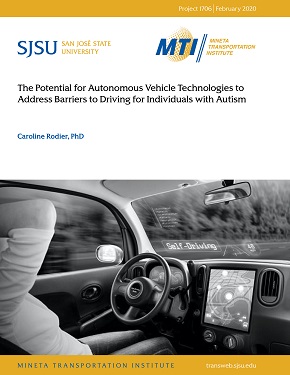- 408-924-7560
- mineta-institute@sjsu.edu
- Donate
The Potential for Autonomous Vehicle Technologies to Address Barriers to Driving for Individuals with Autism
Individuals with autism represent a sizeable share of the U.S. population (almost 2%), and nearly half of those with autism have average to high levels of intelligence. However, available research shows that adults with autism have a much more difficult time becoming employed and living independently compared to both typically developing adults and adults with disabilities. This study reviews the available literature on the magnitude of challenges to driving and accessing essential opportunities for adults with autism, and the potential of autonomous vehicles to address those challenges. This study is unique in that it identifies the specific driving challenges and needs faced by those with autism. The study makes the following recommendations: (1) Occupational therapists certified for driving rehabilitation should evaluate the driving abilities of those with autism and provide enhanced driver training, with and without autonomous vehicle technologies (i.e., warning systems, steering, acceleration/deceleration, and braking systems) to address any driving challenges; (2) If autonomous vehicle technology is shown in (1) to be necessary to allow for safe driving, then public funding should be made available to help with its purchase, just as funding is currently made available for those with physical disabilities to modify vehicles with adaptive equipment; (3) More tests of high automation should be conducted to affordably expand transit access; however, in the interim, public funding should be made available to subsidize ride-hailing services when transit is not a feasible travel option for those with autism; and (4) More research is needed to evaluate the effectiveness of autonomous vehicle technology interventions for driving (in 1) and expanding transit access (in 3).
CAROLINE RODIER, PhD
Dr. Caroline Rodier is a researcher at the Institute of Transportation Studies at the University of California, Davis. Her current research interests include the use of automated vehicle and shared mobility technologies to address the unmet travel needs of disadvantaged populations. This research spans the development and evaluation of pilot programs to scenario simulations with macro-scale activity-based travel models. More importantly, she is the mom of a daughter on the autism spectrum who does not want to drive!
-
Contact Us
San José State University One Washington Square, San Jose, CA 95192 Phone: 408-924-7560 Email: mineta-institute@sjsu.edu






